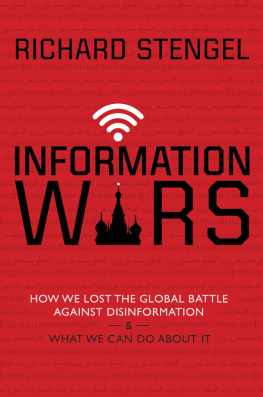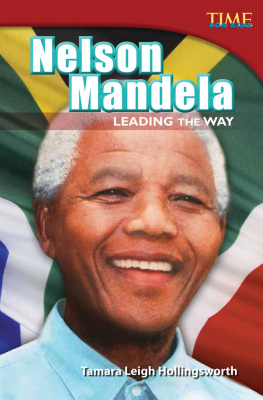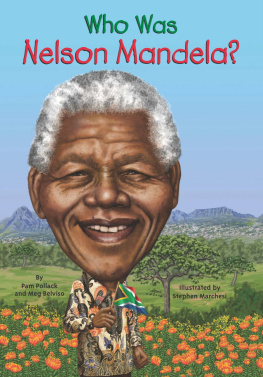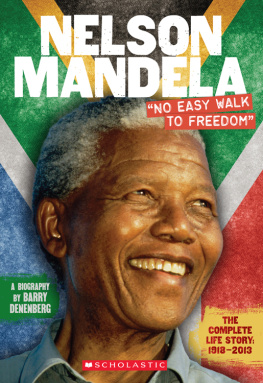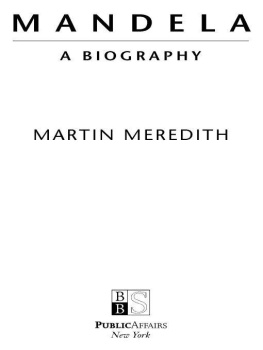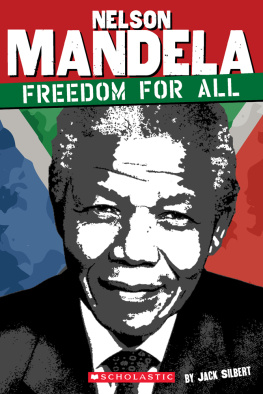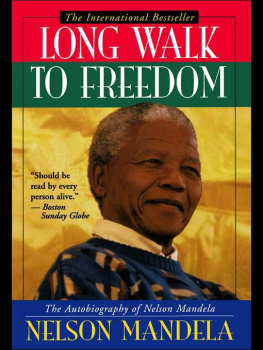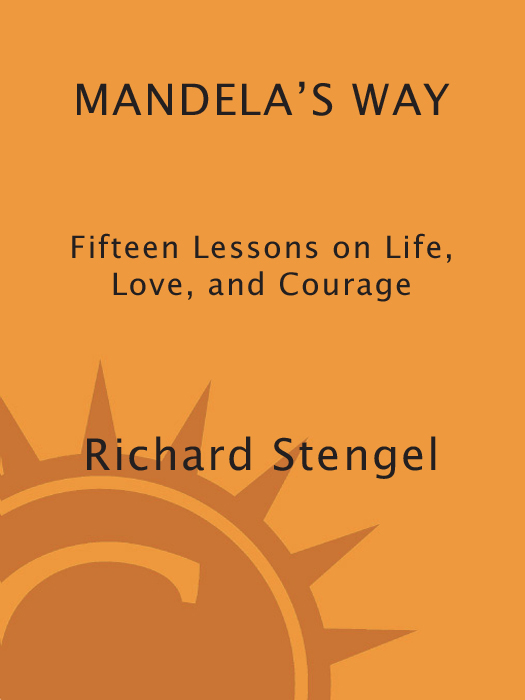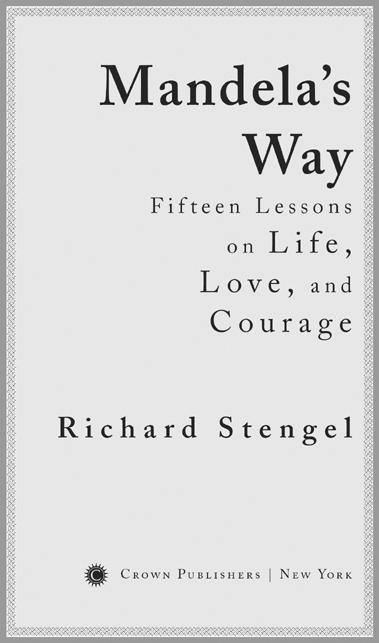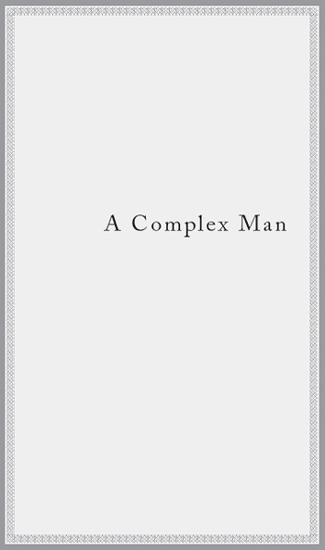For Anton and Gabriel
Contents
Preface
In Africa there is a concept known as ubuntuthe profound sense that we are human only through the humanity of others; that if we are to accomplish anything in this world, it will in equal measure be due to the work and achievements of others. Richard Stengel is one of those people who readily grasps this idea. He is an outstanding writer with a deep understanding of our history. We are enormously grateful to him for his collaboration on the creation of Long Walk to Freedom. We have fond memories of the many hours of conversation and hard work we put in together on that project. He has shown remarkable insight into the many complex leadership challenges still facing the world today and all the individuals in it. Everyone can learn from it.
Nelson Mandela, November 2008
W E LONG FOR HEROES but have too few. Nelson Mandela is perhaps the last pure hero on the planet. He is the smiling symbol of sacrifice and rectitude, revered by millions as a living saint. But this image is one-dimensional. He would be the first to tell you that he is far from a saintand that is not false modesty.
Nelson Mandela is a man of many contradictions. He is thick-skinned but easily wounded. He is sensitive to how others feel but often ignores those closest to him. He is generous with money but counts his pennies when giving a tip. He will not step on a cricket or spider but was the first commander of the African National Congresss military wing. He is a man of the people but revels in the company of celebrities. He is eager to please but not afraid to say no. He doesnt like to take credit, but will let you know when he should get it. He shakes the hands of everyone in the kitchen but doesnt know all of his bodyguards names.
His persona is a mixture of African royalty and British aristocracy. He is a Victorian gentleman in a silk dashiki. His manners are courtlyafter all, he learned them in colonial British schools from headmasters who read Dickens when Dickens was still writing. He is formal: He will bow slightly and hold out his arm for you to go first. But he is not the least bit finicky or primhe will talk in almost clinical detail about the toilet routine in prison on Robben Island or how it felt when his foreskin was sliced off in his tribal circumcision ritual at the age of sixteen. He will use fancy silverware when he is in London or Johannesburg, but when he is in his home area of the Transkei he enjoys eating with his hands, as is the local custom.
Nelson Mandela is meticulous. He takes tissues from a box and refolds them individually before placing them in his front pocket. I have seen him remove his shoe during an interview to reverse one sock when he notices it is inside out. In prison, he made a fair copy of every letter he wrote over two decades, and kept a detailed list of every letter he received, with the date he got it and when he replied. Until his marriage to Graa Machel, he slept on one side of his king-size bed, while the other side remained pristine and untouched. He rises before dawn and makes his bed precisely every morning, whether he is at home or in a hotel. I have seen the look of shock on hotel housekeepers when they find him making the bed. He hates to be late and regards lack of punctuality as a character flaw.
Ive never known a human being who can be as still as Nelson Mandela. When he is sitting or listening, he does not tap his fingers or his foot, or move about. He has no nervous tics. When I have adjusted his tie or smoothed his jacket or fixed a microphone on his lapel, it was like fussing with a statue. When he listens to you, it is as though you are looking at a still photograph of him. You would barely know he was breathing.
He is a power charmerconfident that he will charm you, by whatever means possible. He is attentive, courtly, winning, and, to use a word he would hate, seductive. And he works at it. He will learn as much as he can about you before meeting you. When he was first released, he would read journalists pieces and praise them individually with specific details. And like most great charmers, he himself is easily charmedyou can accomplish that by letting him see that he has won you over.
The charm is political as well as personal. Politics is ultimately about persuasion, and he regards himself not so much as the Great Communicator but as the Great Persuader. He will either get you through logic and argument or through charmand usually a combination of the two. He would always rather persuade you to do something than order you to do so. But he will order you to do so if he has to.
He wants to be liked. He likes to be admired. He hates to disappoint. He wants you to come away from meeting him thinking that he is everything you had ever hoped for. This requires tremendous energy, and he gives of himself to almost everyone he meets. Almost everyone gets the Full Mandela. Except when he is tired. Then his eyes droop to half-mast and he seems asleep on his feet. But Ive never known a man to be so revived by a nights sleep. He can seem at deaths door at ten P.M. , but then eight hours later, at six A.M. , he will seem sprightly and twenty years younger.
His charm is in inverse proportion to how well he knows you. He is warm with strangers and cool with intimates. That warm benign smile is bestowed on every new person who comes within his orbit. But the smile is reserved for outsiders. I saw him often with his son, his daughters, his sisters, and the Nelson Mandela they know often appears to be a stern and unsmiling fellow who is not terribly sympathetic to their problems. He is a Victorian/African father, not a modern one. When you ask him something he doesnt want to talk about, he will fix his face into a frown of displeasure. His mouth becomes an inverted cartoon of his smile. Do not try to force the issue or he will simply become stony and turn his attention elsewhere. When that happens, it is like a sunny day that has suddenly become overcast.
Mandela is indifferent to almost all material possessionshe does not know or care about the names of cars, couches, or watchesbut Ive seen him dispatch a bodyguard to drive an hour to get his favorite pen. He is generous with his children when it comes to money, but dont count on his generosity if you are his waiter. The two of us once had lunch at a fancy hotel restaurant in Johannesburg where he was waited on hand and foot. The bill came to well over one thousand rand, and I watched as Mandela examined some coins in his hand and left a few tiny pieces of change. After he had gone, I slipped a one-hundred-rand note to the waiter. It was not the only time I ever did so.
He will always stand up for what he believes is right with a stubbornness that is virtually unbending. I very often heard him say, This isnt right. Whether it concerned something mundane or of international importance, his tone was unvarying. I heard him say it when a security guards key would not open his office, and I heard him say it directly to South African President F. W. de Klerk about the constitutional negotiations. He used the phrase for years on Robben Island when talking to a guard or the head of the prison. This isnt right


